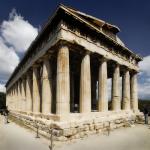|
This section contains 2,192 words (approx. 8 pages at 300 words per page) |

|
Ecstatic Dance.
Dance and song were a part of every religious festival, but in some, dance was an instrument with which the dancer could achieve a closer communion with divinity by entering into a state of rapture. The violent whirls and leaps of the dance brought the dancer into a state of ecstasy. The goddess Cybele, known as the Great Mother, whose cult center was in Phrygia in western Asia Minor, was attended by eunuch priests called Corybantes, devotees of the goddess who castrated themselves with flint knives after dancing to the accompaniment of cymbals and castanets until they attained a state of utter rapture. Among the twelve Olympian gods and goddesses of Greece, the nearest counterpart of Cybele was Demeter, who presided over the fertility of the earth, and the dances performed in her honor were generally full of lively movements. In the ancient festival...
|
This section contains 2,192 words (approx. 8 pages at 300 words per page) |

|




